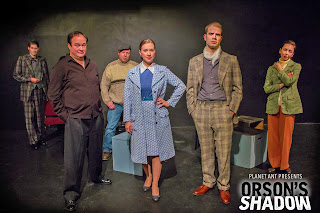Thursday, January 14, 2016
How'd she do it?
(Tying up loose ends, Part 2)
(This is the second of two commentaries in which the cranky critic catches up on shows he attended this past December, but for various reasons didn't get around to writing about till now. He hopes to do better in 2016.)
It was an unofficial team-up.
Its backstory was a long time in the making. Since its establishment in 1997, Hamtramck's Planet Ant Theatre has had a succession of artistic directors, each of whom had (or, currently, has) a unique vision for the popular venue. And since its founding in 2000, The Abreact has produced its shows in a handful of performance spaces throughout the Downtown, Greektown and Corktown neighborhoods of Detroit. Both, at times, shared similar visions, and it wasn't unusual to find some of the same artists working at both places.
So when the powers-that-be at The Abreact decided last year it was time to leave its most recent home and look for a new location, it made total sense that artistic director Chuck Reynolds would use his downtime to direct a show at Planet Ant. It also didn't surprise me that the show would feel equally at home at Planet Ant as it would have on the stage of The Abreact - and that many of the actors would be familiar to longtime patrons of each theater.
In short, "Orson's Shadow" had the vibe of an Abreact production and a Planet Ant production, and the result was one of my most favorite shows so far this season.
In his review of the play for EncoreMichigan.com, critic Frank Anthony Polito described "Orson’s Shadow" as "the behind-the-scene story of the time when Orson Welles took on the challenge of directing Sir Laurence Oliver and his soon-to-be bride Joan Plowright in a production of Ionesco’s 'Rhinoceros' in London’s West End in 1960. As one might imagine, the clashing of egos between Welles and Olivier is enough fodder to make for a compelling drama. Throw in Olivier’s fanatical actress wife, a chain-smoking theater reviewer, and a stoic stagehand and the most serious of scenarios becomes a laugh-riot."
He couldn't have summarized it better.
Such a script has plenty of pitfalls, however, since its main characters are - or were - familiar faces to the movie-going public. How do you get audiences to shake their memories of Welles and Olivier? Can any local actor believably fill their costumes?
Yes, and Reynolds pulled it off because of tight, intense directing and a team of skilled actors who fully invested themselves in their roles.
Few actors came to mind for the role of Welles when Chuck first told me about the show many, many months ago - and the one whom I first thought of indeed played the character. Joel Mitchell dominates whatever stage he crosses - as did Welles - so while little physical similarities exist between the two, Mitchell had no problem erasing the image of the larger-than-life Welles from my mind; the power of his performance left no doubt who he was.
I was a bit concerned about the choice for Olivier, however. While the other actors were age-appropriate for their roles, handsome Jonathan Davidson was much too young. But here's yet another case of a young actor stepping up to the challenge, as Davidson - with theatrical magic to add years to his look - kept up with Mitchell (which is not an easy task) and convinced me Reynold's choice was a solid one.
Fine performances were also given by the always excellent Dax Anderson as the theater critic, TM Rawlins as Vivian Leigh, and Bryan Spangler as the Irish stagehand.
In all honesty, though, much of my attention was focused on Kelly Rossi, whose Joan Plowright quietly, but strongly maintained control of the men around her. Most impressive was a segment in which she was sitting mere inches from - and looking stoically towards, but not directly at - the audience. From what I could tell - and I watched closely - her focus never wavered, never once accidentally making eye contact with anyone sitting near her. Nor did her eyes ever dart away, even for a second. How she did that, I'll never know.
What helped, I'm sure, was the blanket of quietness and calm that had descended upon the audience as they sat riveted to the action unfolding before them. The intimacy of the space and our desire to focus on the story brought us into the action as unseen participants. Rarely was a cough or a candy wrapper heard from the utterance of the first line to the very last.
That, my dear readers, is a sign of an excellent production!
CLICK HERE to read the review from EncoreMichigan.com
CLICK HERE to read John Monaghan's review in the Detroit Free Press
Subscribe to:
Post Comments (Atom)


No comments:
Post a Comment